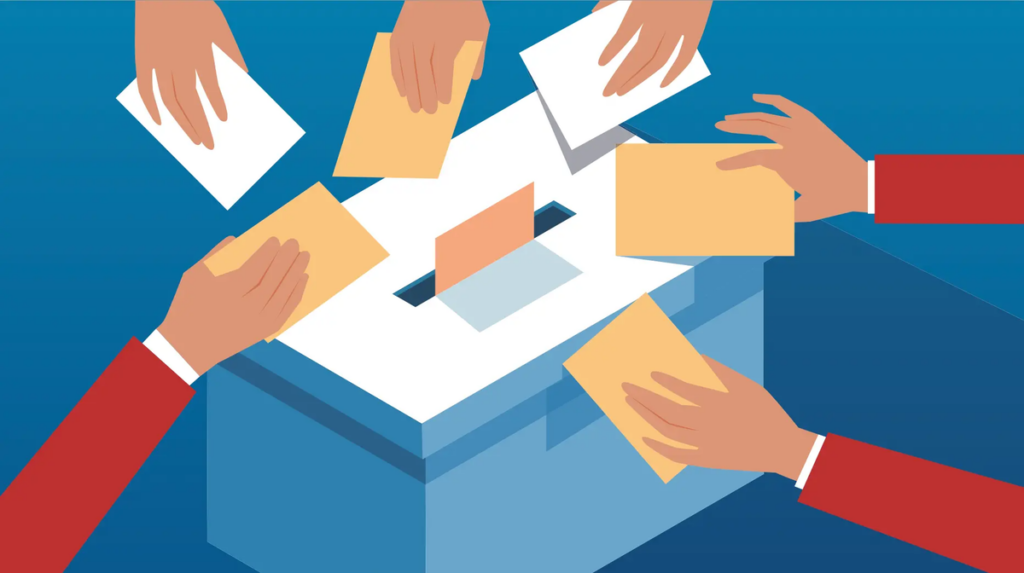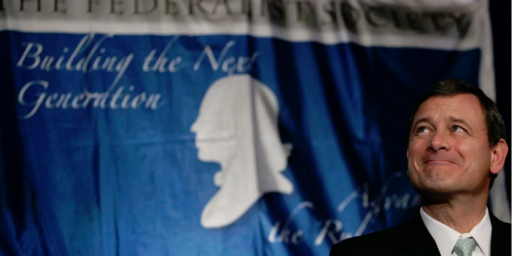On Parties
Because I think it is really important.

So, by way of preface let me note that I fully accept that no one who reads what I write has to agree with me. And while, yes, I like to win arguments (who among us doesn’t?), I revisit and try and refine my positions not to bludgeon readers (or a specific reader) but because I really think all of this is important. And, moreover, when I am told I haven’t made my case I am temperamentally and professionally compelled to try again.* I also always fear that maybe I have not been sufficiently clear, so I will try again for that reason as well. So, yes, I am trying to address issues that emerged in my post from yesterday and the discussion that erupted in the comment section.
By the way, yes, I think I am right, else why write this stuff? I am, after all, using part of my Sunday morning to do this. But, I remain open to learning that I am wrong.
Also, I actually am a weirdo who likes writing about this stuff.
At any rate, let me start with the following sketch of my view of parties from a previous post which is also noted below (I started to do a shorter version of this list, but then realized I had already done it:
[Here is] a basic theoretical underpinning of why I think [parties in a representative democracy are] important. I will stick to mostly just declarative sentences.
- Parties are an almost natural consequence of representative democracy.
- Party labels function as signaling devices to the population to provide at least a basic notion of what politicians who adhere to a given label will do in office. Note that this is often all the information a given voter might have about a given candidate.
- Parties serve a key role in organizing government.
- Ideally, elections should provide a chance for voters to reward or punish parties based on whether they performed as their labels suggest they should.
- The number of parties in a given system is a function of how cleaved a given society is (e.g., ideological, linguistic, ethnic, religious, etc.) plus how the prevailing electoral rules translate votes into office.
- It stands to reason that a country with substantial ethnic, religious, and other cleavages (e.g., India) would have more parties than a less diverse country (e.g., Japan).
- The ideal number of parties is an open normative question, with the theoretical bounds being one party for every single voter to one party only. In more practical terms we can discuss the question of how much fragmentation is too much versus not enough. Too much fragmentation would make governing difficult and not enough fragmentation means that the various interests of a given society are being inadequately taken into account when governing decisions are being made (or that some factions have undue influence on outcomes relative to their actual size in the population).
- For representative democracy to function optimally, representation needs to do an adequate job of approximating the political views of the society as a whole, within reason.
- Ideally, if a set of interests in society feel left out, they should be able to form new parties to compete for a piece of power to further their interests. (The cost of enrtry should be reasonable).
- Accountability and competition should create some level of churn of who is in charge, and who seeks office.
So, let me emphasize that parties are a natural (and I use that word specifically) result of representative democracy (I said “almost” above, but that is typical academic hedging as maybe there are some limited conditions in which they would not emerge, but really, I think we can cut the “almost” from the assertion). This is, by the way, a fact that Madison plainly missed. When a system requires collective action to aggregate interests (i.e., by voting for representatives) all evidence suggests that parties form in response.
As per the above, parties perform a key function. Parties are supposed to create a linkage between label, which is a shorthand for what the party stands for and will pursue in office, and the voter who understands, in basic terms, that Party X will do roughly X, while Party Y will do roughly Y, etc.
And, as related to numbers 5, 7, 8, and 9 above, the evidence demonstrates that any time there are even semi-proportional rules used to elect legislatures, a multi-party system emerges, especially if the country in question is of any size, population-wise.** This suggests that two parties are highly unlikely to be a real representation of a given population of any size. I think this is a scientifically significant observation: when populations are given a chance, they break into more than two parties. Political Science does not like to make definitive statements given that human beings refuse to conform to laws of behavior the way that electrons do, but I think the claim can be credibly made that rigid two-partism is an anomaly and that populations naturally support multipartism. This is an empirically true statement based on hundreds of observations over roughly a century that when the rules give voters a choice, more than two parties emerge.***
I wrote a whole series of posts on the issue of the number of parties in a system. I would especially point readers to the multi-part part 4 of that series, especially Part 1 (from which the list above comes).
- On the Number of Parties 1: Basic Counting, Part 1
- On the Number of Parties 2: Basic Counting, Part 2
- On the Number of Parties 3: More Sophisticated Counting
- On the Number of Parties 4: The Oddity of Two, Part 1
- On the Number of Parties 4: The Oddity of Two, Part 2 (A Note on Historical Stability in the House)
- On the Number of Parties 4: The Oddity of Two, Part 3 (Thinking About Just Two)
At the most basic level, I am of the view that the US system does not adequately represent the actual interests of US citizens and that the general level of democratic accountability is terrible. And, again, it isn’t just about the number of parties, but it is unequivocally true (in my informed opinion) that things like the too-small House, primaries, and single-seat districts all combine to limit party formation (among other problems that I constantly write about and that are impossible to fully cover even in a long post).
Do more parties guarantee good policy? No, but such is the reality of people being in charge of things. To quote Douglas Adams, on the topic of politics, “People are a problem.”
Or, to quote Madison, “In framing a government which is to be administered by men over men, the great difficulty lies in this: you must first enable the government to control the governed; and in the next place oblige it to control itself.” Good institutional design accomplishes this goal, while problematic institutional design undercuts it.
I fundamentally believe, following Aristotle through to Madison and on to contemporary political science that if one’s hope for good governance is simply to have good people in office, then we are all screwed. Instead, it is necessary to try and harness various incentives in a society to try and create the best conditions we can for good governance.
If, for example, politicians want to stay in power, then force them to have to please voters to stay in office (not primary voters, but voters writ large). And if they really don’t have to perform well to win reelection, then there is no adequate democratic feedback loop. Period.
In my view, a key component of this is making politicians accountable to voters by having competitive elections that are reasonably reflective of the general interests and preferences of the population. And, also, parties who help channel those interests with as much clarity as is reasonable.
Voters, of course, can elect pretty horrible people (or parties) to office. There is very little that can be done to prevent this fact. And if a true majority of your country is hellbent on wrecking democracy or doing other awful things, your problem may well be beyond the scope of institutional design to fix.
A straightforward example of why I think that an opening for multiple parties is good for representation and should promote better governance is as follows.
Suppose that there is a white nationalist or otherwise problematic faction in society that is large enough to have some electoral heft.
In System One there are only two viable parties, and the rules make it fairly easy to access those parties (i.e., run under the label of that party). Many politicians who seek power use the permeable nomination process to start to win seats in the Conservative Party. Conservative voters, many of whom (like all voters) only pay marginal attention, vote for white nationalist candidates because, well, the ballot says that they are “Conservatives.” As a result, the Conservative Party moves towards the reactionary right. Voters often then adjust their views to adapt to the new party line.****
After all, they have voted Conservative all their lives, as did their parents and grandparents! And, sure, some of the new Conservatives are are bit inflammatory, but hey, what else do you expect these Conservative voters to do, vote for the crazy Liberal Party? They are a bunch of woke commies over there, dontcha know!
In System One either the Conservative Party or Liberal Party will control the legislature and if one of the parties has a hard time electing a leader, there is no partner to reach out to save the other party, a move that is political poison.
In System Two there are viable pathways for more than two parties to win seats in the legislature and access to the established party labels is more limited because party leadership asserts more control. A white nationalist faction tries to emerge in the existing Right Party but the leadership of that party is not on board. Because there are clear electoral pathways for more than two parties the white nationalists form the Very Right Party and run in elections and win seats. Voters have a clear choice between the Right Party and Very Right Party and while some of the Right Party voters likely defect to the Very Right Party, it is clear what people are voting for.
In System Two there are multiple parties with which to form partnerships. So when the Right Party wins a plurality of seats and needs to form a government they don’t have to automatically go to the Very Right Party to do so, but can perhaps work with the Kinda Middle Party instead.
From my perspective, System Two does a better job of representative democracy because it allows for more than two parties to represent the interests of citizens. Moreover, it provides far clearer signals via elections as in System One if a voter votes for the Conservative Party we are not sure as observers if they are voting that way because they are old-school conservatives or white nationalists (and for the matter, the vote may not fully know which camp the candidate they are voting for is in). But in System Two it far, far clearer that the Right Party and the Very Right Party are distinct.
Moreover, it seems fairly straightforward that the odds of effective governance that reflects the overall interests of the population are much higher in System Two than in System One.
BTW, in the varying discussions of “governance” as it pertains to the number of parties, I am not entirely sure what all the interlocutors mean by the term. If the idea is linked to specific policy outcomes, that becomes impossible to know whether more parties are better or worse. From my perspective, if we are going to say we want a representative democracy then the best way to create accountability for political outcomes is to make as direct as possible a linkage between what is promised by a party and what the party delivers in office. Therefore, at a bare minimum, more parties should enhance the signaling power of party labels. And the mechanisms that would promote more parties (such as a more proportional representation system) also help cultivate a more responsive political class as votes and outcomes are more directly linked and easier to understand than is the case in our system presently.
Thanks to all who indulged me by reading all of this.
(BTW, System One is the US, and System Two is Germany).
*Side note: I know that there is at least one reader/commenters who once declared that he hated it when I wrote another post in response to a comment thread. I will state that while I understand that I have a privileged position vis-a-vis commenters in these discussions insofar as I can then move a comment-based discussion into a front-page post, I never understood why more content on a subject that people were obviously engaged in was a problem. Ah well.
**Even in places like the UK, Canada, and India, which use FPTP, more than two parties emerge. As per my linked series of posts above, the US is utterly abnormal in its rigid bipartism. And, as I harp, I think primaries are the main reason for this.
***And no, I do not think the US electoral system creates the circumstances for more than two viable choices. I agree that in theory, our system allows for more than two parties, but as I argue over and over and over again, the structure of the rules utterly disincentivizes politicians to run as third-party candidates and likewise disincentivized voters from voting for them.
****There is a vast political science literature that demonstrates the connection between elite and mass views.






Whatever else Steven, know this: I don’t comment all that often but I always learn something from your posts, even if it is just a different way of looking at things. So I thank you for that.
Seems like one of the first things to go when you have a high degree of partisan identity is accountability. How many power grid failures in Texas will lead Republican voters in Texas to vote for a Dem? Trump was impeached twice and has dozens of criminal charges against him and he is still a lock for the nomination next year.
Are Democratic voters the same? It seems like the third party threat always comes from the left, which suggests Democratic voters are less likely to blindly vote for the D candidate.
We have to hit a breaking point at some point. I’m all for the American experiment but when one party starts routinely nominating common criminals I question the legitimacy of the outcome.
A question, from my ignorance of UK and early American politics. I have only a WIKI level understanding. The British Tories existed in some form on and off from 1679 and got control of Parliament from 1783 through 1830. The Whigs existed more or less from the 1680s. They were active while Madison and the boys were drafting the Constitution. Hamilton started the Federalists from the get-go.
It’s conventional wisdom that the Founders failed to take into account that parties would form. How could the Founders miss the implications of parties? Seems like there’s got to be more to this story than I’m aware of.
@Paine: I would note that part of my point about the rigidity of our two-party system is that it makes it all the harder for accountability because punishing your side means helping the “enemy”–even if you just abstain. There is no viable safety valve.
@gVOR10: A simple answer is that when we look at British parties it was not in the context of actual representative democracy. Really, parties as we understand them emerged in the 19th century.
What Madison really missed is the way in which permanent electoral-legislative groups (i.e., parties) would emerge. He though that factional differences would be more fluid than ended up being the case.
@OzarkHillbilly:
There is no higher complement!
@Paine:
Or perhaps this: How many power grid failures in Texas would lead a significant number of constituents to raise holy hell with their (Republican) officials and, if they don’t feel they are getting adequate response, support primary opponents, making it clear that the reason is because of their failure to address the issue? Oh, and by the way, how many will not get side tracked by racist and class dog whistles?
To be honest, I find the whole idea that the only way to hold government officials accountable is to vote for a different party to be pretty darn short sighted.
I thought over your response to my comment yesterday. I think you are correct and it has helped to refine or even change my thinking. It’s not just that conservative voters all went crazy, but it’s our system of government that either encourages it or doesnt stop it. While there may be forces within media or think tanks that want to radicalize a party (or an A hole billionaire) it really shouldn’t happen if people within that party have choices but they dont. The choice is to conform or leave.
Steve
We have seen a national party implode and disappear once in our history. The Whigs disappeared and got replaced (sorta) by the Republicans. Just in time to get Salmon Chase elected governor of Ohio, and Lincoln president.
I’ve been watching the Republican slow-motion crackup and wondering if that is going to happen again. The stakes aren’t as high as with slavery, so maybe not. But yeah, 3 parties would do much better are representing us than two. Maybe 4.